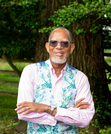Larry Benjamin's Blog: Larry Benjamin's blog - This Writer's Life, page 7
October 11, 2015
In Honor of National Coming Out Day
In honor of National Coming Out Day (which also happens to be my birthday), my LGBT coming of age/coming out novel, Unbroken is just 99 cents! If it's been on your TBR list you may want to buy it now.
Coming out for me wasn't hard--I was never "in, by which I mean closeted. I could never see the point. I mean what was the point--you just had to look at me to know; I've discovered that people see what they want to see so if someone didn't know, it wasn't my fault. I didn't see the point of hiding. I mean, sure people might dislike me because I was gay, they might even try to hurt me, but the same could be said of me being black—just look at the number of black people being hurt and killed by the police—the very people they are supposed to look to for protection. So was I supposed to hide myself away? never leave the house lest I walk into a store and be followed as a potential shoplifter? Or wrestled to the ground and tasered for asking, “What the fuck are you following me for?”
Nah. Besides, at seventeen when I left for college, I knew I’d never find a boyfriend if I remained hidden, ashamed, in the shadows. I realize, even now, my story is not the norm but I have no doubt that will change.
On their way out, the woman stopped by our table. “God bless you,” she said. “My husband and I have been watching you. You’re a very handsome couple—”
“Thanks,” Willow said, “but we’re not a couple. He’s gay.”
The woman looked at me more closely, with a mix of curiosity, and suspicion. “You are?”
“I am,” I said.
After she left, Willow threw back her head, and laughed.
“You see how easy that was? You just have to say that to Jose, ‘Yes, I am,’ and see where it leads."
--from Unbroken
Coming out for me wasn't hard--I was never "in, by which I mean closeted. I could never see the point. I mean what was the point--you just had to look at me to know; I've discovered that people see what they want to see so if someone didn't know, it wasn't my fault. I didn't see the point of hiding. I mean, sure people might dislike me because I was gay, they might even try to hurt me, but the same could be said of me being black—just look at the number of black people being hurt and killed by the police—the very people they are supposed to look to for protection. So was I supposed to hide myself away? never leave the house lest I walk into a store and be followed as a potential shoplifter? Or wrestled to the ground and tasered for asking, “What the fuck are you following me for?”
Nah. Besides, at seventeen when I left for college, I knew I’d never find a boyfriend if I remained hidden, ashamed, in the shadows. I realize, even now, my story is not the norm but I have no doubt that will change.
On their way out, the woman stopped by our table. “God bless you,” she said. “My husband and I have been watching you. You’re a very handsome couple—”
“Thanks,” Willow said, “but we’re not a couple. He’s gay.”
The woman looked at me more closely, with a mix of curiosity, and suspicion. “You are?”
“I am,” I said.
After she left, Willow threw back her head, and laughed.
“You see how easy that was? You just have to say that to Jose, ‘Yes, I am,’ and see where it leads."
--from Unbroken
Published on October 11, 2015 17:26
•
Tags:
coming-out, larry-benjamin, lgbt, national-coming-out-day
October 9, 2015
Why Queer Romance Matters…It’s Personal
I was asked to be a write a guest post for Queer Romance Month, which I gladly did. It was originally posted on Day 2, Friday Oct 2, on the Queer Romance Month blog.
The feedback and comments the post received encouraged me to share it here.
I read. A lot. And I collect books. I have nearly 3,000. Many are classics—Fitzgerald, Wells, Dickens, the Brontés. Virginia Wolfe. But many more are contemporary gay fiction ranging from newer, lesser known writers to the literary lions of gay literature: Felice Picano, Mark Merlis, E.M. Forster, Baldwin, Burroughs (William, not Augusten), Alan Hollinghurst, William J. Mann, David Leavitt.
The first queer novel I read was Patricia Nell Warren’s "The Front Runner." I remember finding it at the book store at Penn freshman year. My roommates, who were on the track team, were at an away meet that weekend. I read the entire book before they returned, barely stopping to sleep and eat. I read "The Fancy Dancer," too. But it was "The Front Runner" that started me on the pursuit of queer fiction. From then on I read queer romance and queer fiction almost exclusively.
I was hungry for stories about people like me. In retrospect some of my choices make me blush in embarrassment—Gordon Merrick comes to mind—but back then queer books weren’t so easy to find. And I needed queer stories. Even if the stories weren’t really about me. They seldom had any people of color or anyone who wasn’t spectacularly good looking or outrageously “hung.” Reading, I would superimpose myself, my experiences, over each of those author’s texts—much like I’d done when the only GI Joe dolls available were white.
In discovering queer fiction, I had discovered I was not alone; I could finally visualize a life lived with a beloved man at my side. I was truly grateful to the gay authors who had the courage to tell queer stories. But I was increasingly frustrated with the white homo-normative narrative. Where my stories, the stories of our brothers and sisters who were other, who were outside, should have been, there was only silence.
But those queer stories also needed to be told. They were a part of our larger queer stories. We need stories that reflect the spectrum of our lives and loves. We need stories of queer men who find love and romance even if they aren’t handsome or hung or white. That said I don’t believe there are black stories and white stories, there are just stories but I do believe that no one in the queer community should be marginalized or invisible—in life or in literature.
There are no black stories. There are no white stories. There are just stories. Queer stories matter because they allow us to share our lives, to show the world we varied, we are different but not so different, not really. The value is in allowing us—each of us—to see queer selves, our differences, celebrated and reflected.
You can read the original post, or leave a comment to enter to win a copy of Unbroken, or Vampire Rising here
The feedback and comments the post received encouraged me to share it here.
I read. A lot. And I collect books. I have nearly 3,000. Many are classics—Fitzgerald, Wells, Dickens, the Brontés. Virginia Wolfe. But many more are contemporary gay fiction ranging from newer, lesser known writers to the literary lions of gay literature: Felice Picano, Mark Merlis, E.M. Forster, Baldwin, Burroughs (William, not Augusten), Alan Hollinghurst, William J. Mann, David Leavitt.
The first queer novel I read was Patricia Nell Warren’s "The Front Runner." I remember finding it at the book store at Penn freshman year. My roommates, who were on the track team, were at an away meet that weekend. I read the entire book before they returned, barely stopping to sleep and eat. I read "The Fancy Dancer," too. But it was "The Front Runner" that started me on the pursuit of queer fiction. From then on I read queer romance and queer fiction almost exclusively.
I was hungry for stories about people like me. In retrospect some of my choices make me blush in embarrassment—Gordon Merrick comes to mind—but back then queer books weren’t so easy to find. And I needed queer stories. Even if the stories weren’t really about me. They seldom had any people of color or anyone who wasn’t spectacularly good looking or outrageously “hung.” Reading, I would superimpose myself, my experiences, over each of those author’s texts—much like I’d done when the only GI Joe dolls available were white.
In discovering queer fiction, I had discovered I was not alone; I could finally visualize a life lived with a beloved man at my side. I was truly grateful to the gay authors who had the courage to tell queer stories. But I was increasingly frustrated with the white homo-normative narrative. Where my stories, the stories of our brothers and sisters who were other, who were outside, should have been, there was only silence.
But those queer stories also needed to be told. They were a part of our larger queer stories. We need stories that reflect the spectrum of our lives and loves. We need stories of queer men who find love and romance even if they aren’t handsome or hung or white. That said I don’t believe there are black stories and white stories, there are just stories but I do believe that no one in the queer community should be marginalized or invisible—in life or in literature.
There are no black stories. There are no white stories. There are just stories. Queer stories matter because they allow us to share our lives, to show the world we varied, we are different but not so different, not really. The value is in allowing us—each of us—to see queer selves, our differences, celebrated and reflected.
You can read the original post, or leave a comment to enter to win a copy of Unbroken, or Vampire Rising here
Published on October 09, 2015 12:55
•
Tags:
larry-benjamin, lgbt, queer, romance, unbroken, vampire-rising
September 7, 2015
Remembering Coco

Two years ago today, we had to let go of our precious girl, Coco. She was fighting heart disease and the effects of old age. We knew it was time and she let us know she was ready. Still, it was hard. She wasn’t the first dog we’ve lost—but in the intervening years, grief had lost its edge.
We’d had to put down my first dog, Channing, after an attack by a neighborhood pit bull. For a decade he’d been my most constant and cherished companion, predating Stanley. I was, to put it mildly, devastated. It wasn’t until we adopted Coco that Stanley stopped looking at me with anxiety and inexpressible sorrow. Weeks after we got her, I was talking to my mother on the phone and something she said made me laugh. She paused and said, “You know, after Channing died I didn’t think I’d ever hear you laugh again.”
It was only then that I realized how deep and visible my grief had been. Coco’s ashes sit on a shelf in the library beside those of Channing.
I made an appointment for that Saturday at 3. Stanley left work early and met us there. I’d spent the entire day holding Coco, loving her, but he hadn’t seen her since early that morning. He walked into the exam room where we waited and said “I thought I was ready for this, but I’m not,” and dissolved into tears. I sat opposite holding Coco and watched this handsome, strong man, my rock, falling apart before my eyes. I thought, not for the first time, there is nothing harder to watch than another’s grief. Especially when it is someone you love who is grieving.
“She’s gone,” the vet said quietly then discreetly withdrew. I left the room shortly after knowing that if they came for her while I was there, I would fall to my knees, clutching her, still warm, body to my chest and refuse to let go. Instead, I went outside, lay on the pavement, cured into a ball with our other dog, Toby wrapped tight and cried like I would never stop.
Stanley stayed with her in that bright, clean room, the saddest place on earth, until they came for her because he d-said he didn’t want to leave her there alone.
And now two years later, there remains an empty corner in my heart, where she used to sit. And now two years after her loss, and ten years after we first brought her home, I remain unsure: Did I rescue her? Or did she rescue me?
Read my original post about losing Coco here.
Published on September 07, 2015 15:12
•
Tags:
dogs, grief, larry-benjamin
September 4, 2015
Vampire Rising & Its Angel Number: An Explanation
A reader, who recently finished Vampire Rising, commented that it was different from my other books mostly because with the others I spent a lot of time on character development so readers really got to know the characters. And that is true, with What Binds Us we follow Dondi, Thomas and Matthew for ten years; in Unbroken we first meet Lincoln at age six and Jose at age 12. Their story spans 40 years and we watch them grow from children into brave young men and on into parenthood.
Vampire Rising is a very short book. It tells the story of the damaged Vampire, Gatsby, who is still reeling from a decision made 200 years earlier that saved a life and cost him his love, and the young human, Barnabas, who, abandoned by his mother, becomes a ward of the state, unwanted and invisible for too long.
But the story really isn’t about Gatsby and Barnabas; the story is an allegory, it’s a metaphor for how (poorly) we treat those considered the least among us are a metaphor. But, I tried to give readers a feel for who each is as a person and how he is seen through the eyes of the other, and I do hint at their personal histories, at their back story but I never fully explain either. And that was deliberate. I wanted to focus on the messages in the story.
I looked to great works of fiction as inspiration for Vampire Rising. Bram Stoker’s Dracula, Harper Lee’s To Kill and Mockingbird, and the Bible, all informed the book.
“Remember it’s a sin to kill a mockingbird.”
These words spoken by Atticus Finch in To Kill and Mockingbird inspired me to replace the signature bat with mockingbirds in Vampire Rising. For the Vampires, like blacks, like Jews, like gays, are not sinful, or guilty, they simply are. And they are innocent in their simply being, in their inability to be otherwise, in their authenticity.
“In manus tuas domine.”
These words spoken by Gatsby to Barnabas, are a quote from Dracula (Van Helsing mutters it on first entering the house of Dracula); the words are also an abbreviation of the last seven words Jesus is reported to have spoken from the cross. Translated as “Into your hands Lord,” these words underscore one of the book’s central themes: trust is essential to life, to love, to partnership.
But it is the address of Gatsby’s house—197 Chicksand Street—that most informs the book. The address, taken from Stoker’s Dracula was the address of one of the houses Dracula buys in and around London. In point of fact it is not an existing address but if it was, it would fall squarely in the center of the area where Jack the Ripper was most active at the time Stoker wrote Dracula.
But what intrigued me most was the number: 197. It is an “angel number”—it is believed that angel numbers are used by our guardian angels to communicate with us.
Keep Reading.
Vampire Rising is a very short book. It tells the story of the damaged Vampire, Gatsby, who is still reeling from a decision made 200 years earlier that saved a life and cost him his love, and the young human, Barnabas, who, abandoned by his mother, becomes a ward of the state, unwanted and invisible for too long.
But the story really isn’t about Gatsby and Barnabas; the story is an allegory, it’s a metaphor for how (poorly) we treat those considered the least among us are a metaphor. But, I tried to give readers a feel for who each is as a person and how he is seen through the eyes of the other, and I do hint at their personal histories, at their back story but I never fully explain either. And that was deliberate. I wanted to focus on the messages in the story.
I looked to great works of fiction as inspiration for Vampire Rising. Bram Stoker’s Dracula, Harper Lee’s To Kill and Mockingbird, and the Bible, all informed the book.
“Remember it’s a sin to kill a mockingbird.”
These words spoken by Atticus Finch in To Kill and Mockingbird inspired me to replace the signature bat with mockingbirds in Vampire Rising. For the Vampires, like blacks, like Jews, like gays, are not sinful, or guilty, they simply are. And they are innocent in their simply being, in their inability to be otherwise, in their authenticity.
“In manus tuas domine.”
These words spoken by Gatsby to Barnabas, are a quote from Dracula (Van Helsing mutters it on first entering the house of Dracula); the words are also an abbreviation of the last seven words Jesus is reported to have spoken from the cross. Translated as “Into your hands Lord,” these words underscore one of the book’s central themes: trust is essential to life, to love, to partnership.
But it is the address of Gatsby’s house—197 Chicksand Street—that most informs the book. The address, taken from Stoker’s Dracula was the address of one of the houses Dracula buys in and around London. In point of fact it is not an existing address but if it was, it would fall squarely in the center of the area where Jack the Ripper was most active at the time Stoker wrote Dracula.
But what intrigued me most was the number: 197. It is an “angel number”—it is believed that angel numbers are used by our guardian angels to communicate with us.
Keep Reading.
Published on September 04, 2015 10:28
•
Tags:
197, angel-numbers, larrry-benjamin, vampire
August 13, 2015
The Making of a Book Trailer

When we released my allegorical Vampire novella, Vampire Rising, in July, I quickly realized I wanted to create a book trailer for it. To make a book trailer I knew I had to meet a new challenge—I’d already told the story—but for the video I needed to retell it. Visually. This was the challenge. I am a story teller: in my day job I tell stories; if you’ve ever met me in person and spoken to me you will, no doubt, remember I am prone to telling stories; as a writer, I tell stories. But for my writing life, I focus on the words—the words for me are as important as the story itself. I want to use the right words, to define a mood, to capture the rhythms I hear it in my head.
Having written four books, I’m fairly confident in my voice but I knew I’d have to rely on images and actions, rather than words, to tell the story. The story’s main premises are simple enough: “history repeats itself,” and “people are people.” The story is told in certain colors: purple and gray and silver and black and white are the predominate colors. The main elements are an elaborate wrought iron gate and mockingbirds. We managed to capture these for the book’s cover. But how could I replicate that on video?
Continue reading this post here.
Published on August 13, 2015 11:14
•
Tags:
fantasy, larry-benjamin, lgbt, vampire-rising
July 14, 2015
"Ekaj," a Movie Not to Be Missed
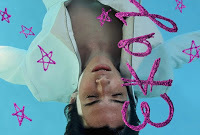
Back in July 2012, I wrote a blog post about an LGBT film, “Prince and Ekaj,” which was being made by Mike and Cati Gonzalez. (Read the original post here.
The trailer was very promising and I was excited to see the film giving voice to LGBT youth who often remain invisible, voiceless. So, I was delighted the other day when I got an email from Cati telling me they had completed the film, now titled, “Ekaj,” and asking if I wanted to preview it. My answer, in a heartbeat, was, “heck yeah.” And I am so glad I said yes. The movie covers topics not often seem or spoken of—homeless youth, finding a way to survive and love in a harsh world. Happily the film doesn’t dwell on any one thing but it covers a range of very real issues that are seldom spoken of anymore, and when they are they are it is in whispers, or spoken of as if they existed in the distance past: AIDS, drug abuse, domestic violence, rape. This is a socially responsible film that is never pathetic or preachy.
Keep Reading.
Published on July 14, 2015 18:19
•
Tags:
cati-gonzalez, ekaj, larry-benjmain, lgbt, lgbtq, mecca
July 1, 2015
Weighing in on the SCOTUS Decision
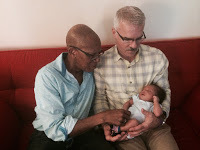
I read about a year ago that the marriage equality movement had reached critical mass which meant it was essentially unstoppable; it could be resisted, it could be delayed but change was gonna come. And come it did, last week when SCOTUS, in a 5-4 decision, made marriage equality the law of the land.
Like most successfully married couples, Stanley and I know each other better than anyone else knows us: he knows I miss seeing my father, that I hate the idea of being buried, knows I wish to be cremated; I know Stanley is loving, and generous and so is an organ donor.
To those wishing to deny me my fundamental rights based on their “religious beliefs,” I have this to say: I do not want to get married in your church before your God for I believe in neither. I don’t believe in your religion, a sanctified lean-to built on a foundation of fables, hearsay and superstition. And I don’t believe that a God, who would allow His son to be nailed to a cross, who would allow generations of innocents to be enslaved and slaughtered, who would allow children to die and animals to be abused, gives a damn what I choose to do or not do with my dick.
Our commitment ceremony 18 years ago was about love, and a promise made to each other. Our marriage last year was about protection. It guaranteed that as I lay dying no one could deny Stanley the right to sit at my bedside and hold my hand. It guaranteed that should one of us die before the other, no member of either of our families could remove the remaining widower from the house we’d sacrificed to buy, the home we’d made together; no one could take the books off the shelves on which I’d placed them, or remove the art we’d hung together. I always maintained that not being able to get married had not kept us apart and being married wouldn’t keep us together but it could protect us from others who would try to separate us, who would deny what we had and what we meant to each other.
I was taken aback at the hostility with which some people greeted the Supreme Court decision in favor of marriage equality. My own Twitter stream was populated with comments from people who seemed to despise me for…being different, for being me, for claiming my right to equal treatment. I finally silenced them for, just as my marriage has no effect on their own marriages, their small-minded meanness has no effect on mine thanks to SCOTUS.
But even as I was filled with dismay for the enmity of total strangers, I was filled me with joy and hope at the idea that our nephew, Max, born June 12, 2015, will never know a time when his uncles were not married, may, indeed, never be able to conceive of a time when they could not have been married. (Note: That is Max we are holding in the photo.)
Keep reading.
Published on July 01, 2015 12:20
•
Tags:
gay, gay-marriage, larry-benjamin, lgbt, marriage-equality, scotus, supreme-court
June 18, 2015
Spam
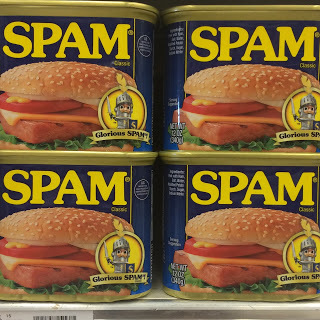
There’s a woman in Germany named Mel here on Goodreads who writes wonderful reviews—insightful, and entertaining without giving away too much away. She caught my attention because she has been going through my books and reviewing each one. She started reading Damaged Angels and posting reviews of each story.
Her review of my short story “Spam” caught my attention. Of it, she wrote:
Oh my... this one’s a riddle. At least to me. It’s kinda impossible to say what’s real and what not. And while I’m confused, I still appreciate this. In the end it doesn’t really matter what exactly went down here.
Her review led me to decide I would dedicate this blog post to explaining that story.
Spam,” is, in a way, a story about identity. Identity has been much talked about. First it was gay identity, then transgendered and gender non-conforming identity (though I think gender non-conforming identity has always existed and been talked about). Then, there was the recent fallout over Rachel Dolezal’s identifying as black.
I’ve always wondered: when it comes to identity—who are we?—Are we who we appear to be? Or who we believe we are?
Keep reading.
Published on June 18, 2015 09:35
•
Tags:
damaged-angels, identity, larry-benjamin, lgbt, spam-identity
June 13, 2015
Weighing In On…Rachel Dolezal—Why Does Race Remain Locked, Unchangeable?
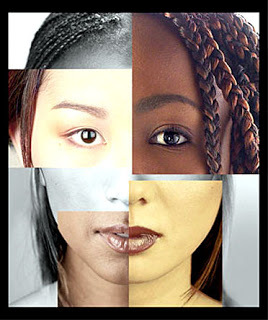
I must admit that when I first read about Rachel Dolezal―who leads the Spokane chapter of the NAACP, teaches African studies to college students and sits on a police oversight commission, and who claims to be black when she may not be by birth―I was surprised and amused. You see, my short story, “Howdy Billy, Cabbage Ma’am,” from Damaged Angels deals with the same issue—a privileged white woman masquerades as black for decades and is eventually found out. But the more I read, the madder I got. It seems the entire controversy surrounds how Rachel Dolezal identifies racially. Say what?
Why are we so outraged by Rachel Dolezal’s racial identification in an age when we are told gender exists on a spectrum and can be “fluid,” in an age when it is argued that marriage is the right of any two people in love? Why are we outraged by this when we accept the fluidity of gender roles and embrace the reality of stay-at-home dads, and women on the battlefield? Just the other day I saw a trash collector who was not only female but Muslim.
Why is it, that race alone remains locked, solid, unchangeable?
Keep reading.
Published on June 13, 2015 09:09
•
Tags:
damaged-angels, gender, identity, larry-benjamin, race, rachel-dolezal, racism
June 10, 2015
Catching Up with… Mark William Lindberg
This week I’m chatting with the remarkable Mark William Lindberg, a queer author, artist, performer, and educator. We're talking about everything from his writing process to his new release, Queer on a Bench, to the use of gender neutral pronouns.
Check out the conversation here.
Check out the conversation here.
Published on June 10, 2015 18:49
•
Tags:
gay-fiction, larry-benjamin, lgbt, mark-william-lindberg, queer
Larry Benjamin's blog - This Writer's Life
The writer's life is as individual and strange as each writer. I'll document my journey as a writer here.
The writer's life is as individual and strange as each writer. I'll document my journey as a writer here.
...more
- Larry Benjamin's profile
- 126 followers


